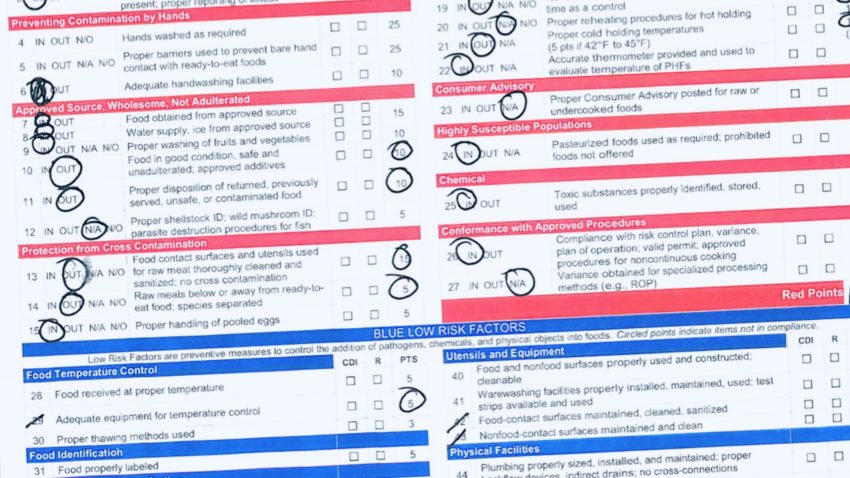Four local restaurants failed food safety inspections in 2019 after reportedly storing raw meats improperly or allowing perishable ingredients to sit out at room temperature. All four restaurants have since passed their follow-up inspections.
Whitman County Public Health officials inspected approximately 130 restaurants and school cafeterias last year. Of the 149 total inspections or re-inspections, just five resulted in failing scores.
Deputy Director Chris Skidmore wrote via email that one restaurant, Azia in Pullman, voluntarily closed for less than two days following a failed inspection in early August. You can read that inspection report here and find a complete log of all 2019 inspection scores below.
“They were allowed to correct their violations and contact us for a re-inspection prior to being allowed to open again,” he wrote. “The majority of violations were related to food handling practices and they were able to correct them in just a few days.”
County officials conduct surprise inspections at public eateries throughout the year, most often watching for potential hazards or practices that could imperil customer or employee health. Read more about the process in our story from last year.
Inspectors assign blue points to “low-risk” violations or red points to “high-risk” violations. County procedures indicate any inspection resulting in more than 40 red points fails, triggering a re-inspection. Any inspection with 85 red points or 100 total points faces closure.
The Azia inspection cited rotten food stored in the restaurant’s walk-in freezer alongside other ingredients. Perishable sauces were stored out on tables and an ice scoop was left in with the ice supply. Counters and floors also needed cleaning.
Inspectors returned two days later and passed the restaurant while still noting the presence of flies and missing towels from the hand-washing area.
Tokyo Seoul failed an inspection in late August following a customer complaint. Inspectors cited contaminated raw meat, insufficient temperature control and the partial cooking of chicken without authorization.
“You cannot partial cook chicken unless you have an approved plan by the health dept,” the inspection states.
Tokyo Seoul also failed its first follow-up inspection in September after officials reportedly saw staff prepping food without gloves and the continued partial cooking of chicken.
The restaurant then passed its second re-inspection in November with zero violation points recorded.
Establishments must pay a $150 fee for their first re-inspection. If they fail their re-inspection, they must pay an additional $300 fee for another follow-up inspection. Skidmore notes the fees must be paid to renew their permits the following year.
In our story from last year, Skidmore explained the complexity of a restaurant’s menu may determine some of its vulnerability to health violations based on increased potential for cross-contamination or multiple reheating stages — particularly in smaller spaces.
“It doesn’t matter how skilled they are,” he said at the time. “If they’re trying to do tons of stuff in a small kitchen, … it’s just easier to find stuff. (And) a lot of Asian restaurants have very complex menus.”
Calls to Azia and Tokyo Seoul did not result in any comment.
Thai Ginger and the Taqueria Las Torres food truck also failed 2019 inspections based on reports of improper food thawing, food stored next to contaminates or insufficient hand-washing facilities. Both restaurants passed their follow-up inspections.
Several other Pullman restaurants such as Pita Pit, Zoe’s Coffeehouse & Pub, and Black Cypress saw lesser violations on their 2019 inspections.
County inspectors also inspected kitchen facilities at all six Pullman public schools twice as well as schools in Colfax, Colton, Endicott, LaCrosse, Lamont, Rosalia, St. John and Tekoa. All schools passed their 2019 inspections.
Find more information on the county’s food safety program here.
